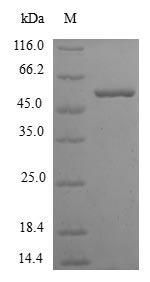Advance your signal transduction research with our high-quality Recombinant Human KHK protein, an enzyme that plays a pivotal role in the metabolism of fructose. Ketohexokinase (KHK) is primarily expressed in the liver, where it catalyzes the first step of fructose metabolism by phosphorylating fructose to fructose-1-phosphate. With its critical involvement in carbohydrate metabolism, KHK is essential for maintaining proper energy balance and glucose homeostasis in the body.
Our Recombinant Human KHK protein encompasses the full length of isoform 2 (1-298 amino acids) and is expressed in E. coli for consistent, reliable production. The N-terminal GST-tag guarantees efficient purification and detection without interfering with the protein's native structure or biological function. With a purity of greater than 90% as determined by SDS-PAGE, our Recombinant Human KHK protein ensures the quality and consistency required for your signal transduction research. Choose between liquid or lyophilized powder forms to meet your experimental needs.






